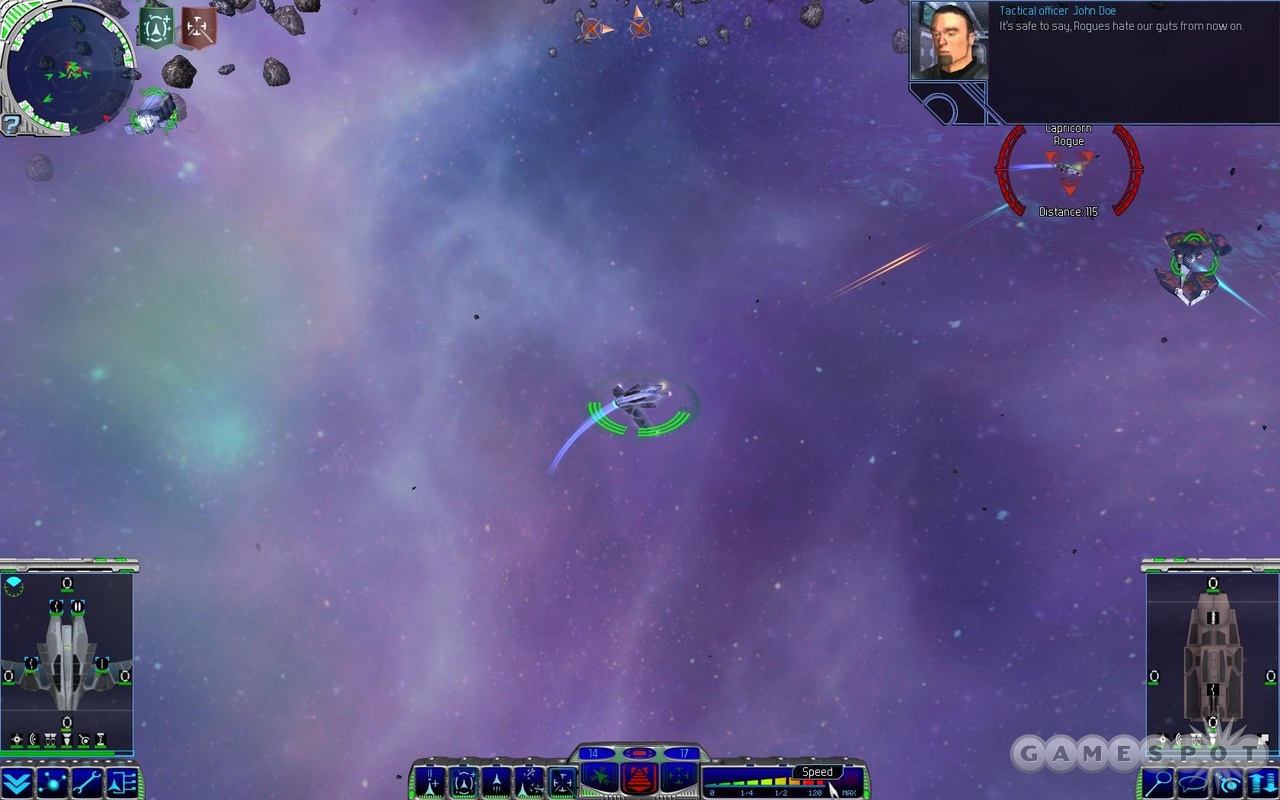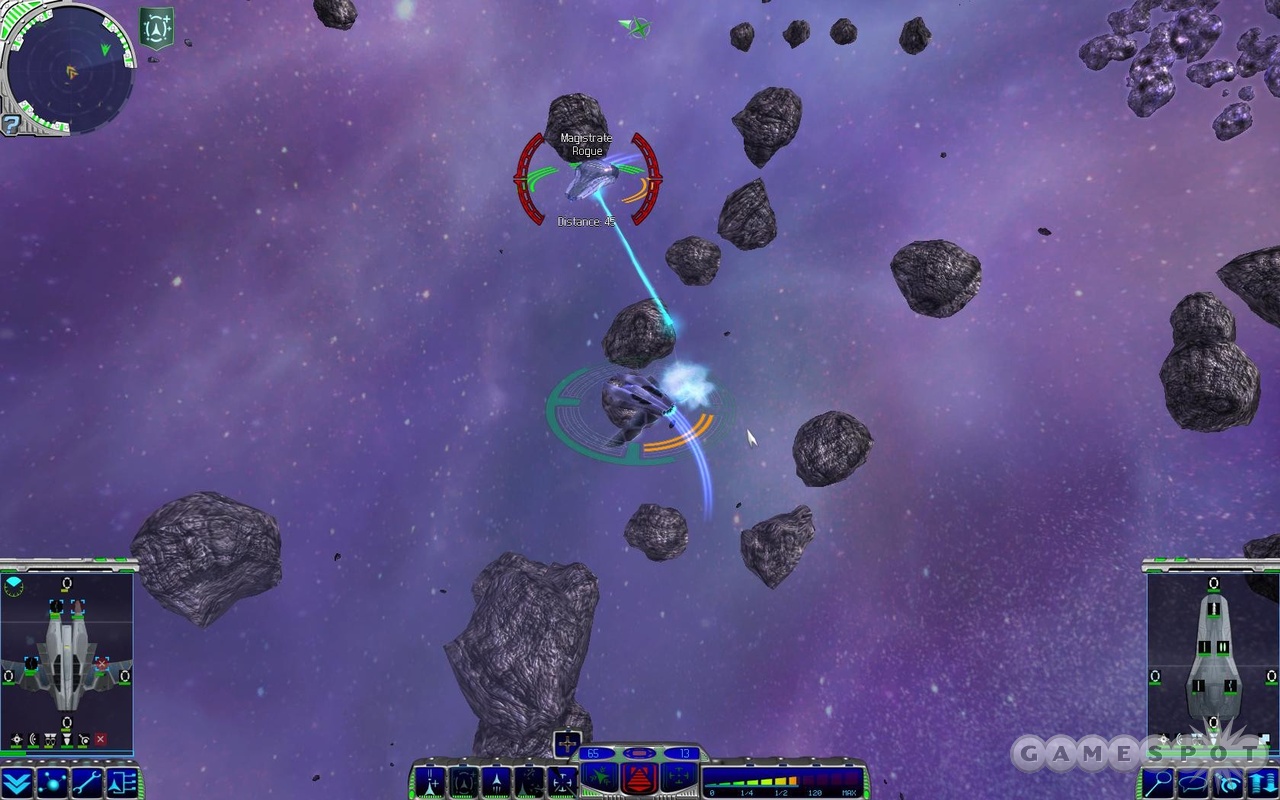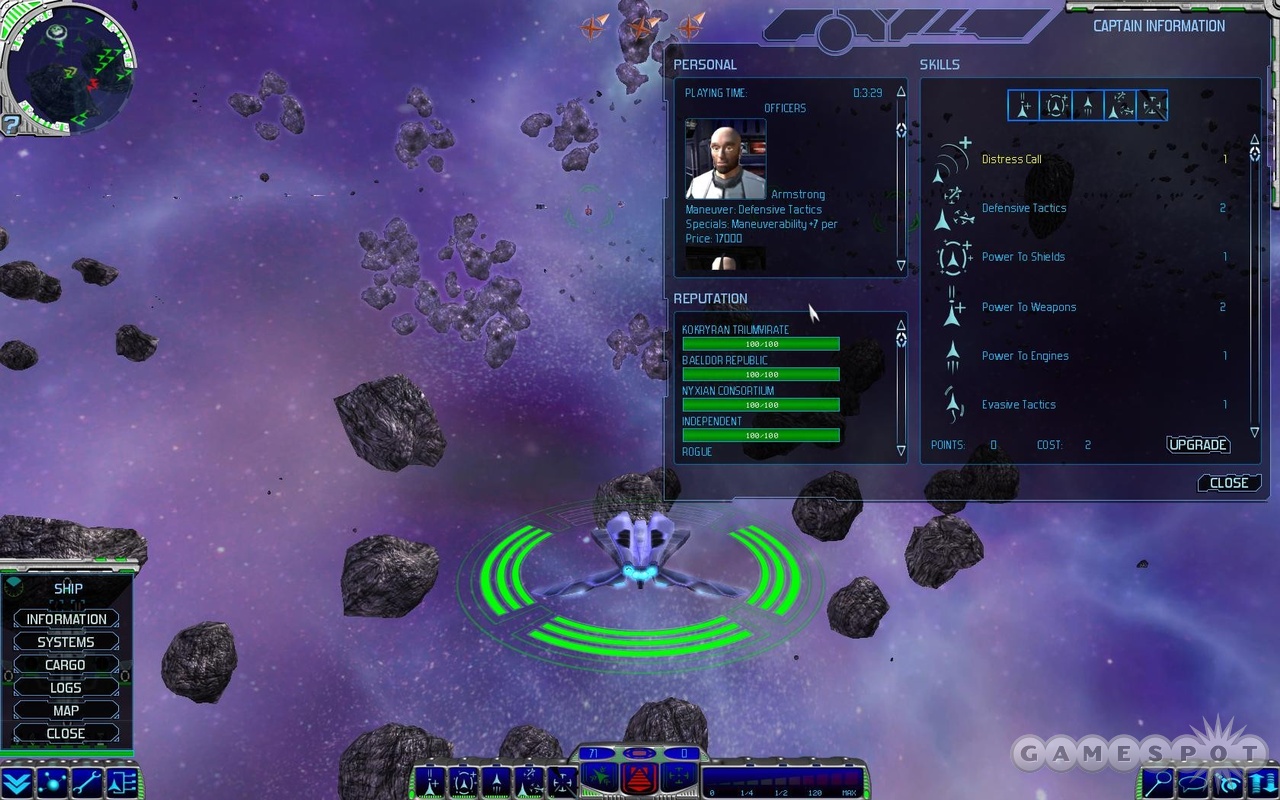This generation of video games has been kind to a number of genres. But it has been pretty miserly to the space sim. Once a dominant genre on PCs, space sims have become an afterthought in mainstream gaming. That scarcity makes the disappointment of Starpoint Gemini all the more difficult to accept.

The story places you 20 years after a war between the freedom fighters of Gemini and a totalitarian Earth regime, a conflict that rent the Gemini sector. A group of scientists pull you out of a stasis rift, a disturbance in space-time caused by the earlier war. As you grow acclimated to the present day, you explore a Gemini torn by strife and political intrigue, a breeding ground for wealthy spacers and battle-hardened warriors. Throughout the game, you encounter periods where the story gives you time to pursue your own activities, be it freelancing, trading, mining, or blasting bad guys.
Starpoint Gemini bills itself as a starship simulation real-time-strategy role-playing game. Its scope is impressive, so much so that it has a little too much going on. Starpoint's biggest issue is that it tries to be too many things. It's a game about outfitting cool spaceships and seeing how well your craft fares out in the space lanes. It's a game about unifying the sector and dealing with the specters of the past. In between story missions, you’re a freelance spacer, taking on assignments in scummy cantinas and posh space stations, or just cruising the sector looking for trouble. When combined, these elements could make for a fantastic space sim. But Starpoint doesn't do any of them well; a little more focus on one or two of these elements could've resulted in a better game.
Combat is similar to what you find in the Starfleet Command series or Star Trek Online (though much faster than the capital ship slugfests found in most Star Trek games). Each ship has four vectors (front, sides, and back; like Khan in Star Trek II, the designers show two-dimensional thinking). Your first volley may take out the enemy's forward shields, but chances are you're going to focus on their rear shields and hull, keeping their weapons away from you while you chew away at their hull's integrity. And while you're doing this, you're also maneuvering to present your strongest set of shields to the foe's weapons. Weapon arcs are important; if you have a ship with nothing but forward-facing weapons, either you've got to capitalize on speed and maneuverability so you can keep those weapons trained on enemy ships in combat, or you had better exchange them for weapons with better firing arcs.

The battles are fun, especially when you're fighting with allies against a host of foes. The controls can be troublesome, however; while you could use a mouse, it's much easier to control your ship with the WASD keys and fire your weapons with the spacebar. The ships maneuver much faster than starships in many other games, and the result is that adjusting your ship's course feels imprecise. You can always use a mouse click, though, to set up a straight course by clicking on your destination or target. And the mouse is especially helpful for targeting a foe (a simple click keeps a foe in your sights).
The battles can also be hard, even during the tutorial. You find yourself dying and restarting multiple times, so be sure to save often. It's also difficult to ascertain what weapons and other gear best suit your ships, so be sure to save before you buy just in case the item you purchase doesn't mount on your spacecraft.
The RPG portion of the game is scant, consisting mostly of distributing skill points instead of making meaningful decisions that affect the sector. The conversation options have little effect on the story, and the only decisions you make (beyond accepting missions, mining, grabbing floating loot, and attacking other ships) are about interacting with other ships. You may ask for directions, commit acts of piracy by trying to seize cargo or ships, or simply say hi and make a pest of yourself. As you gain levels, you allocate perk points for a variety of skills, but it feels more like you're upgrading the skills of your ship than improving the abilities of your captain, leaving you with a game that lacks true character development.
The heavily accented voice-overs are atrocious. The same 10 or so lines repeat over and over again as you travel, regardless of whether they are in context (such as the line complaining about the navigational array, even if you're on course and all is hunky-dory with your equipment). In combat, your foe taunts you--repeatedly--about your ship's lack of weapons and its age and your combat prowess, even suggesting that you should "self-destruction." It's charming in Star Trek IV when Chekov asks about the "nuclear wessels," but when you hear the accented "wessel" time and time again over many hours of playing the game, it becomes grating.

Technical issues mar Starpoint Gemini. The game crashes frequently, mostly when you're using the warp gates during the story missions. The GamersGate version this review started on was so impaired that the game wouldn't even start properly (the game was downloaded multiple times to test this, and the reason for its issues was never tracked down), though the Steam version boots up just fine. And while not a technical issue, traveling about Gemini can be time-consuming and boring.
That Starpoint has such a variety of ships and missions and so much content is a testament to the creativity and skill of its developers. When it cuts you loose to find your own fun, Starpoint Gemini provides some challenge and enjoyment, even if it's telling you to "self-destruction" every five minutes. But myriad flaws and some troublesome bugs make this a galactic journey you should think twice about taking.